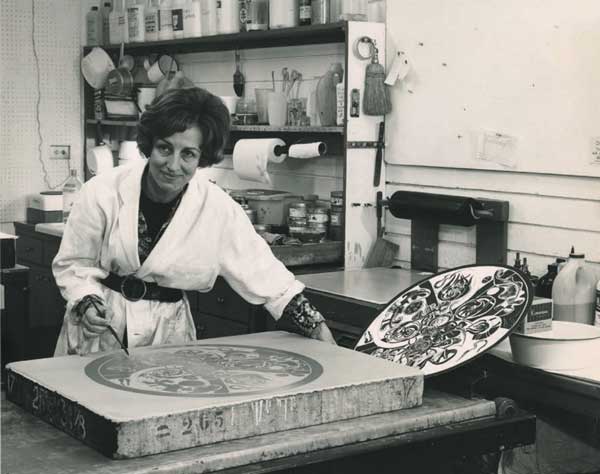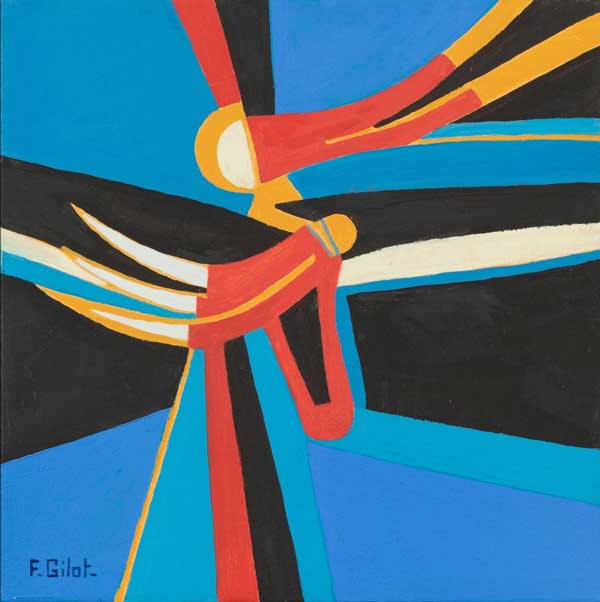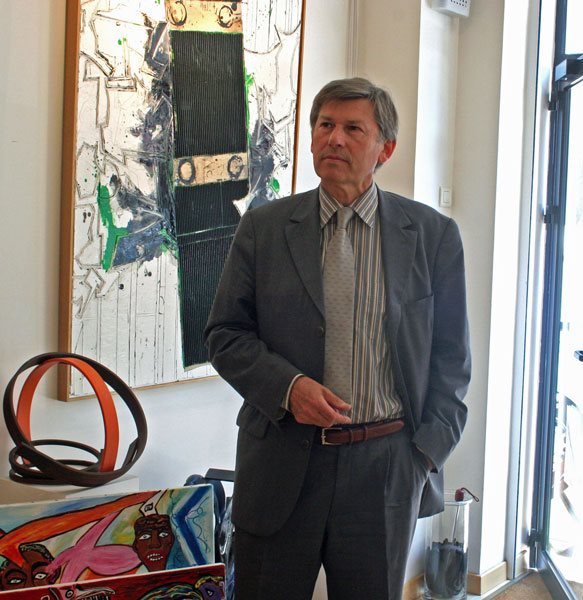Published 15/04/2024 - Born in France in 1921, Françoise Gilot was a remarkable artist whose expansive oeuvre bridged twentieth-century avant-garde and contemporary aesthetics. After completing a degree in English literature in 1938 and briefly attending law school, Gilot began her formal artistic education. In 1941, she began studying with Hungarian painter Endre Rozsda and took classes at the Académie Julian. Two years later during her first gallery exhibition, Gilot met Pablo Picasso. The pair maintained a relationship from 1946 until 1953, during which they had two children, Claude and Paloma.
Black and white photograph of Gilot working at the Tanstone Group in LA, 1971. Image courtesy of The Philip and Muriel Berman Museum of Art.
Around 1946, Gilot deserted oil paintings in favor of graphite, and occasionally gouache, on paper. Gilot's early drawings can be seen in the exhibition and range from portraits and still lifes to abstract works in which she explored formal and symbolic transformations obtainable from simple forms. Gilot began accompanying Picasso to Fernand Mourlot's Atelier in 1950, where she became the first woman to make lithographs in the acclaimed studio—Gilot continued printmaking with Mourlot for decades.
Françoise Gilot, Incertitude. Oil on canvas, 2003-2004
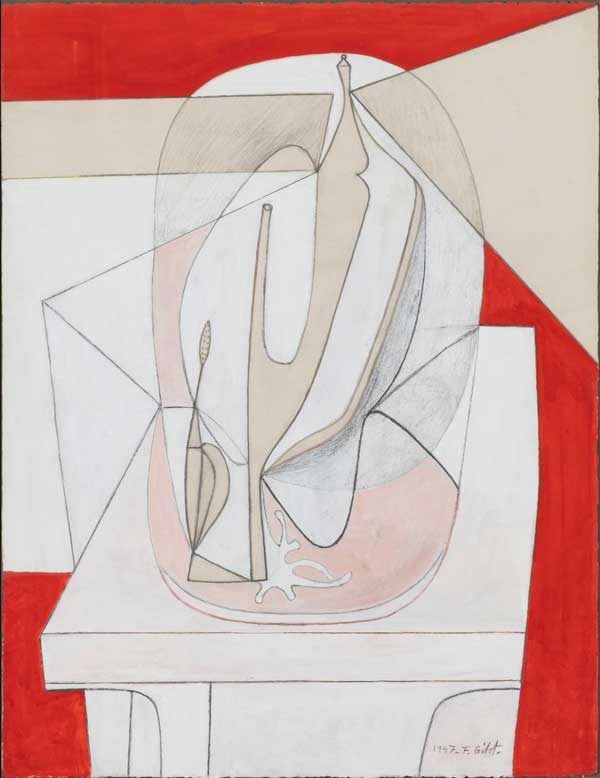 |
|
After ending her relationship with Picasso in 1953, Gilot returned to painting and focused on rendering scenes of her daily life, friends, and family in muted tones. In 1954, she reconnected with surrealist painter Luc Simon who encouraged her more poetic nature. The two married a year later and, in the following year, she gave birth to her third child Aurélia. In 1962, Gilot and Simon divorced amicably. By then, Gilot was associated with the Salon des Réalités Nouvelles, a society founded in 1946 and led by Sonia Delaunay and Nicolas de Staël. |
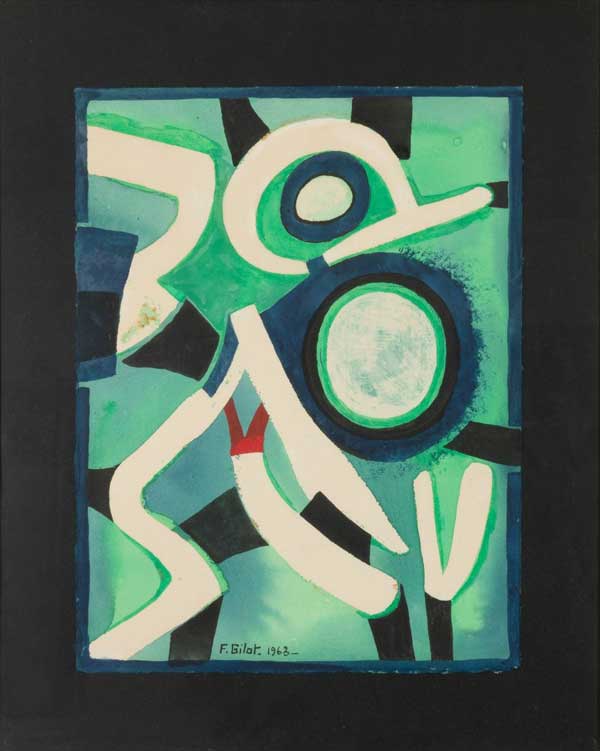 |
| Françoise Gilot, La force centrifuge du labyrinth. Watercolor on paper, 1963 |
|
Invited by June Wayne, founding director of the renowned Tamarind Lithography Workshop, Gilot visited California in 1969 to create lithographs with their master printers. There, she met her future husband, polio vaccine pioneer Dr. Jonas Salk. Gilot became interested in creating monotypes and, in 1985, formed a longstanding partnership with Judith Solodkin, the first female master printer at Tamarind Workshop and director of Solo Impression, Inc. in New York. After decades of primarily figurative work, Gilot began her stylistic transition back towards abstraction. |
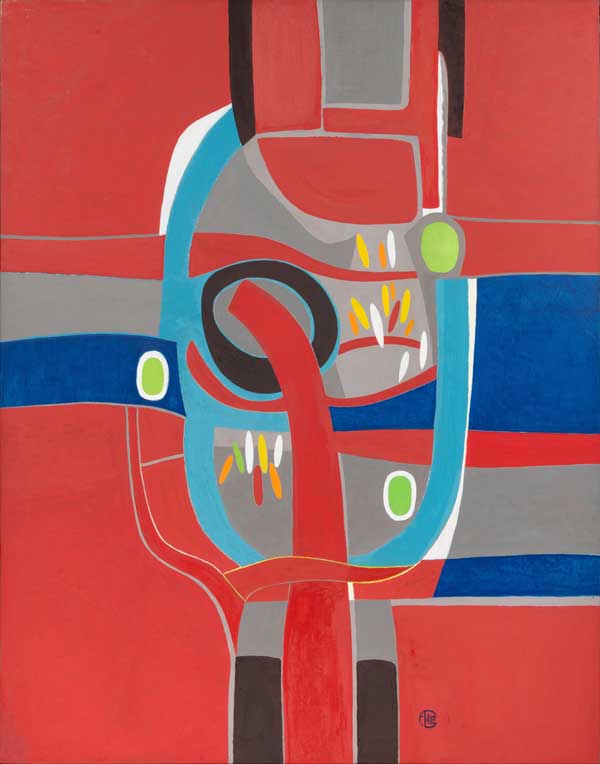 |
|
Françoise Gilot, The Tree of Life. Oil on canvas, 2002. |
|
Following the death of Dr. Salk in June of 1994, Gilot closed her studio in La Jolla and consolidated her paintings in New York City. She was appointed Officier de la Legion d'honneur by the French government in 2010. She remained a vital presence in the art world until her death at the age of 101 in 2023. |
|
Throughout her lifetime, Gilot had major exhibitions at Musée Picasso in Antibes (1987) and The Museum of Contemporary Art, San Diego (1992). Her work can be found in public collections including The Museum of Modern Art, New York; Musée Picasso, Antibes; and Musée d'Art Moderne de la Ville de Paris. Françoise Gilot, will be on view April 3-July 3, 2024. To see a full list of works in the exhibition, click here. Françoise Gilot is accompanied by a catalogue featuring an essay by Matthew James Holman, with introductions by Marianne Rosenberg and Serge Bril Panijel, and contributions by Alain Malraux, Eric Mourlot, and Judith Solodkin. |
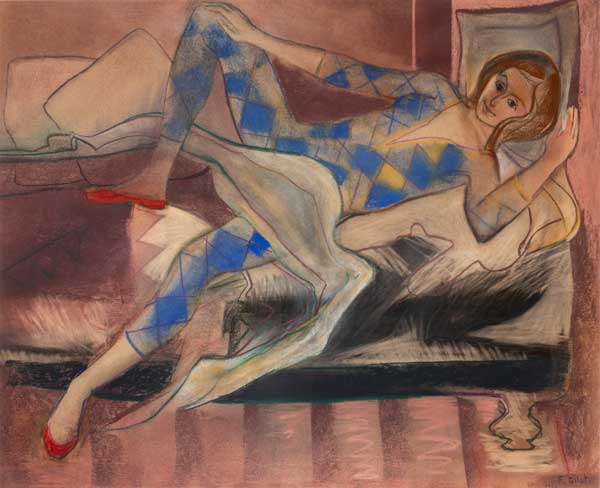 |
|
Françoise Gilot Harlequin at Rest 1956 Pastel on paper |
|
Harlequin at Rest confronts a figure which Picasso favored depicting during his early twentieth-century Rose Period. Created in the years after she had left Picasso, Gilot drew inspiration from a female model and portrayed her as reclined atop a daybed in the typically undignified odalisque pose. Consistently used throughout art history to portray nude women as seductive towards the male gaze, Gilot's use of this pose reappropriates the trope, having her subject confront both the viewer and Picasso with her direct stare and open legs. By presenting the subject as both disruptive and clothed, Gilot and the harlequin assume authority in their respective narratives. |
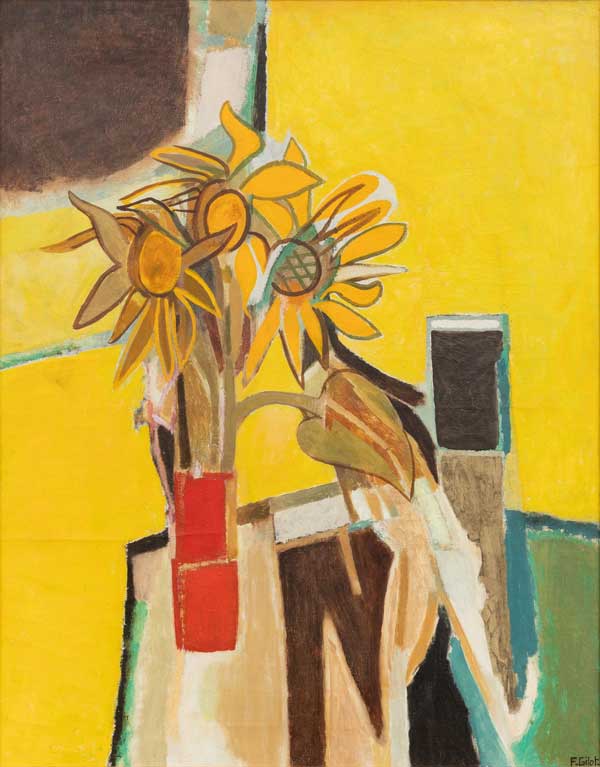 |
|
Françoise Gilot Sunflowers 1958 Oil on canvas |
|
After a decade of creating figuration with muted tones, Sunflowers is one of several compositions from the late 1950s that signals Gilot's departure towards a lasting, personal style of balancing abstract and figurative forms with dynamic colors. Saturating her canvas with vibrant yellows and warm tones, Gilot composed a representational depiction of sunflowers with an obscured, Cubist background that begins as the flowers' stems reach their red vase. This painting further functions as a turning point towards Gilot's individual style by depicting an everyday scene of flora. Previously, Gilot had drawn inspiration from her daily life, including family members, friends, table-scapes, and the rooms in which she worked. As time passed and her style evolved, Gilot continued to depict these themes with a focus on the natural world. |
|
Rosenberg & Co. 19 East 66th Street New York, NY 10065 212 202 3270 Cette adresse e-mail est protégée contre les robots spammeurs. Vous devez activer le JavaScript pour la visualiser. |


